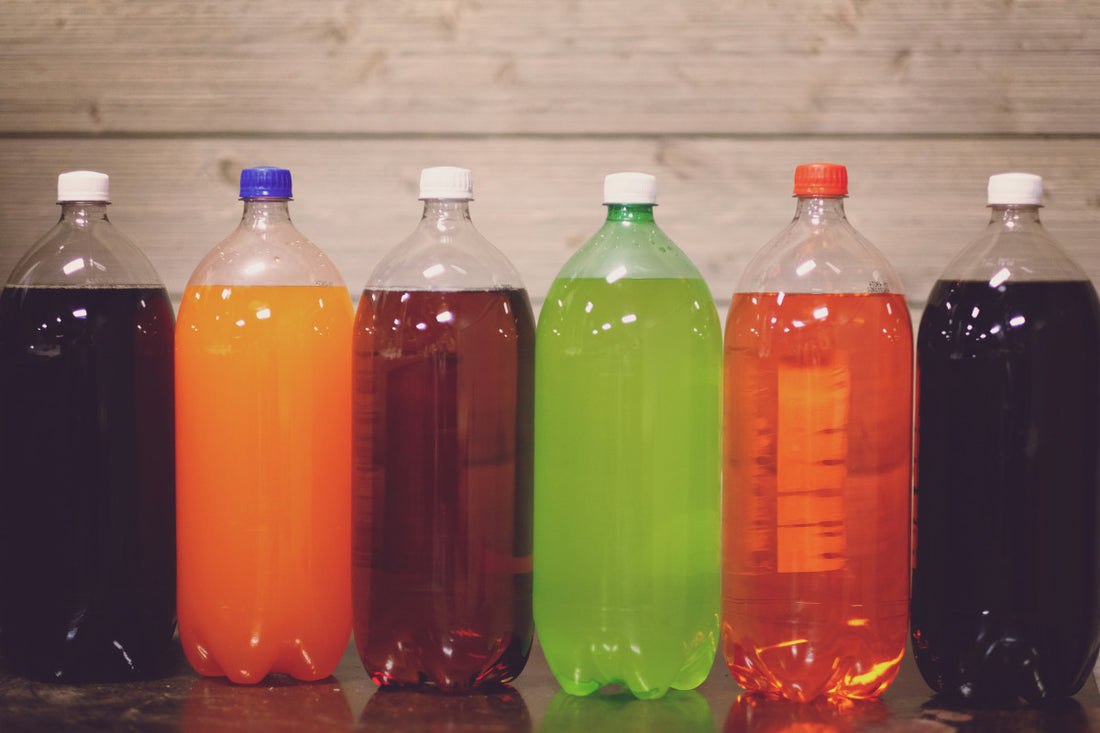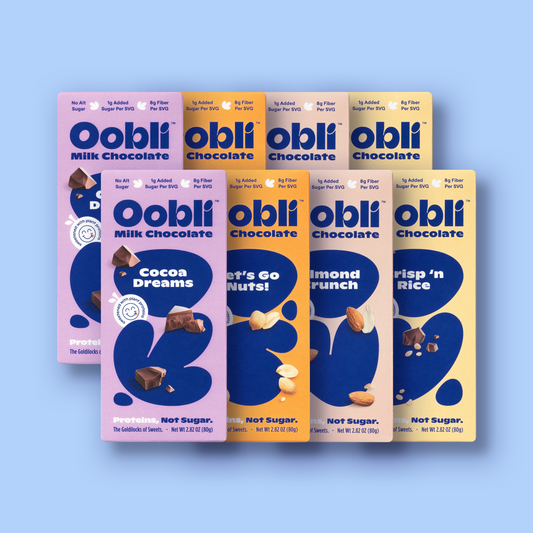Many of us love a sip of bubbling, sweet soda, but we don’t always stop to think about exactly what’s behind that sweetness, because we’d prefer not to know! The grams of sugar in soda can be a bit scary once you actually know just how much sugar is in soda.
Even though we might try to ignore it, it’s better to be aware of what’s going into our bodies. This way, we can make healthier beverage choices, look and feel as good as possible, and live our best lives without the guilt or long-term consequences that can come with high sugar consumption.
So, exactly how much sugar is in a can of soda? In this guide, we’ll crunch the sugar numbers, and explain why it’s so important to keep your sugar intake under control. We’ll even introduce you to some refreshing, healthier alternatives that will help you kick the soda habit for good!
How Much Sugar is in Soda? Overview of the Grams of Sugar in Soda Products
How much sugar is in a can of soda? Well, it depends on a few different things, including the type of soda. Here’s what you need to know about measuring sugar content, and how much sugar you should be consuming as part of a balanced diet.
The Metrics of Sweetness: Teaspoons, Grams, and Percent Daily Value
If you start looking at nutritional labels, you’ll soon see that sugar is measured in a few different ways. You may see teaspoons used, though this is not a very scientific measurement. More commonly, you’ll see grams used. There are around 4 grams of sugar in each teaspoon.
Percent daily value helps you understand how much a serving of soda contributes to your daily recommended sugar intake. It's a guide to making informed choices about your beverage consumption, and helps you stay mindful of just how much sugar you’re getting from soda.
Brand by Brand Analysis: Sugar Content in Popular Sodas
So, how much sugar is in soda? Let’s look at the grams of sugar in soda brands, including how much sugar is in a can of Coke:
- Coca-Cola (12 oz can): Approximately 39 grams of sugar
- Pepsi (12 oz can): Roughly 41 grams of sugar
- Dr. Pepper (12 oz can): About 40 grams of sugar
- Sprite (12 oz can): Contains around 38 grams of sugar
- Fanta Orange (12 oz can): Approximately 44 grams of sugar
- Mountain Dew (12 oz can): Roughly 46 grams of sugar
We can see that these popular sodas all have high levels of sugar. While Sprite is the lowest with 38 grams, that’s still almost 10 teaspoons of sugar in a single can! How much sugar is in Mountain Dew? Almost 12 teaspoons, or 46 grams!
So, now that we know how much sugar is in soda, what does that actually mean? How much sugar is safe? Let’s explore the recommended serving sizes and guidelines for daily sugar intake next.
Serving Sizes and Sugar: How Much is Too Much?
The American Heart Association (AHA) recommends no more than 24 grams of added sugar each day for women, or 36 grams daily for men. So, now that we understand the grams of sugar in soda, we can see that even one 12 oz can puts us over the daily sugar limit.
Why is it so important to monitor our sugar intake, though? Why do the grams of sugar in soda matter, and what are the risks of consuming too much sugar every day? Next up, we’ll explore the risks associated with high sugar consumption.
The Problem With Sugar
Sugar may taste sweet, but the damage it can cause to our bodies is anything but. Let’s take a look at the problems associated with high sugar intake, from immediate impacts to chronic health conditions and the potential addictive cycle that sugar can perpetuate.
Immediate Impacts: Blood Sugar Spikes and Energy Crashes
The sugar rush that follows a sip of soda is no secret, but the immediate impacts on our bodies go beyond a momentary sweet thrill. Consuming high levels of sugar leads to rapid spikes in blood sugar levels, triggering a surge of energy.
These spikes may seem harmless, but they’re not. They can cause heart problems, kidney issues, and nerve problems, to name a few. Also, the sugar surge usually results in a subsequent crash, leaving us feeling fatigued and irritable.
Chronic Conditions: Linking Excessive Sugar Intake to Health Issues
Beyond the instant highs and lows, the long-term effects of excessive sugar consumption are also cause for concern. Scientific studies have linked high sugar intake to an increased risk of chronic health conditions, including obesity, type 2 diabetes, and heart disease.
Consistently elevated blood sugar levels, a consequence of regular soda consumption, can strain the body's ability to produce insulin effectively. Over time, this strain may contribute to insulin resistance, a precursor to type 2 diabetes.
Excessive sugar intake is associated with an increased risk of cardiovascular issues, including heart disease and hypertension. As blood vessels and the heart endure the strain of elevated sugar levels, the likelihood of developing chronic heart conditions rises.
Sugar and Addiction: The Cycle of Cravings
When sugar enters the system, it stimulates the release of dopamine, a neurotransmitter associated with pleasure and reward. This surge creates a sensation of bliss, linking the act of consuming sugar with positive feelings.
Over time, this neurological reward system can pave the way for the development of cravings, as the brain seeks the pleasurable experience associated with sugar consumption.
Beyond the brain's intricate dance with dopamine, the body reacts to sugar in ways that can fuel a cycle of cravings. Frequent sugar consumption can lead to desensitization of taste buds, requiring an increased quantity of sugar to achieve the same level of sweetness satisfaction.
Other Questionable Ingredients in Soda
While sugar is one of the most harmful ingredients in soda, it’s not the only issue. Let’s take a look at some of the other ingredients you need to be aware of, and the potential dangers they can pose to your health.
Beyond the Sweet: Artificial Colors, Flavors, and Preservatives
The eye-catching colors that define sodas are often achieved through the use of artificial dyes, which come with their own risks. Some studies suggest potential links between artificial color consumption and hyperactivity in children, as well as other health issues.
From cherry blossoms to tropical fruits, it seems like there’s a soda in every flavor! Yet, many of these flavors are synthesized artificially. While these artificial flavorings are generally recognized as safe by regulatory bodies, they’ve been linked with kidney damage, migraines, and more.
Preservatives like sodium benzoate and potassium sorbate play a pivotal role in ensuring that sodas remain fresh for extended periods on store shelves. However, concerns have been raised about potential health implications, including allergies and inflammation.
While diet sodas might seem like a healthier alternative, the artificial sweeteners (like sucralose vs aspartame or stevia vs splenda) used to sweeten these beverages can be harmful. Sweeteners have been linked with everything from heart attack and stroke to digestive issues.
The Acidic Environment: Soda's Impact on Digestion and Dental Health
Carbonated drinks often feature phosphoric and citric acids, contributing to their tangy taste. However, the acidic environment created by these compounds can negatively impact both digestion and dental health.
Prolonged exposure to acidic beverages may erode tooth enamel, leading to cavities and dental sensitivity. Also, the acidity can interfere with the digestive process, potentially causing discomfort, bloating, gas, diarrhea, and stomach cramps.
Healthier Alternatives to Soda That Still Taste Great and Satisfy Your Sweet Tooth
If learning how much sugar is in soda has made you keen to find an alternative, you’re in luck! There are a few alternatives to soda that don’t bring the same health concerns - let’s take a look at some popular choices.
Infused Waters: Combining Hydration with Subtle Natural Flavors
Infused waters have become one of the most popular low sugar drinks in recent years. While it’s certainly a healthier option than sugary sodas, carbonated waters still contain citric acid, which can damage tooth enamel.
Also, if you’re infusing your own waters, don’t rely only on citrus - its acidic nature can bring about some of the bloating and digestive issues that come with soda.
Tea and Coffee: Leveraging Natural Caffeine Without the Sugar Rush
Harness the power of natural caffeine with tea and coffee, minus the sugar overload. Opt for unsweetened varieties or add a touch of natural sweetener like honey. Cold-brewed iced tea or coffee can be particularly refreshing, offering a chilled alternative to sodas.
However, make sure you’re aware of how much sugar is in sweet tea and how much sugar is in bubble tea - these versions of tea (along with some types of sweetened iced coffee) may have more sugar than you realize!
Probiotic Drinks and Kombucha: Gut Health with a Fizzy Twist
Combine the goodness of gut-friendly probiotics with a fizzy kick by embracing drinks like kombucha. These fermented beverages not only support digestive health but also offer a unique and tangy flavor profile.
Available in various flavors, kombucha provides a satisfying fizziness that can rival traditional sodas. And, if you’re looking for drink mixes without aspartame or other artificial sweeteners, you’ll be happy to hear that most kombucha and probiotic drinks are free from these additives.
Satisfy Your Sweet Tooth Without the Guilt at Oobli!
At Oobli, we’ve got an even better alternative - our sweet tea! With just 7 grams of sugar in each 16 oz can, it contains almost 90% less sugar than some sodas - that’s a huge reduction! Plus, each can contains over 200mg of antioxidants.
Our keto-friendly, gut-safe sweet iced teas are available in a range of delicious flavors, all naturally sweetened of course! With just a fraction of the sugar and no artificial additives, switching to Oobli is the easiest, healthiest way to kick your soda habit.
While you’re here, don’t miss our chocolate! Our low-sugar, high-fiber recipe is made using 100% clean ingredients, and it tastes amazing! It’s the perfect late-night sweet treat, giving you the satisfying sweetness you need before bed without keeping you awake with guilt!
Final Thoughts on How Much Sugar is in a Can of Soda
So, how much sugar is in soda? The numbers really are staggering - a single can of soda contains more than our entire recommended daily sugar intake. That amount of sugar can cause serious health issues in the long term, including heart disease, obesity, and diabetes.
If you’re looking to switch soda for a healthier alternative, Oobli has just what you’ve been looking for. Our sweet iced teas are naturally fruity, and contain just 7 grams of added sugar. They’re a safer, healthier, guilt-free option, and so tasty that you won’t even miss drinking soda!
Try Oobli today and discover life after unhealthy, sugary sodas - you won’t regret it!




